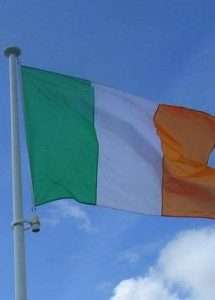Mentally re-running the conversation to put together the pieces and test it against an admittedly scant knowledge of the period, his words seem to have veracity but also asked questions.
Around eighty years of age, he sat with his collie dog in a cool shade on a very warm summer’s day. He had lived in the village as long as I could remember and the thought had never occurred that he might have come from anywhere else.
“My father was an old IRA man, but he said they became gangsters. Do you know what he did? He joined the British Army. He was in North Africa during the war. He used to tell us stories of lying under his lorry to try to find shade. De Valera was useless, only did what suited him. I left in 1957.”
Perhaps an opportunity will arise to talk to him again about his memories of his father and his family in rural Ireland. His father’s shift in loyalties intrigues.
Following the Treaty with Britain, signed in 1921, the conflict between supporters and opponents of the treaty was bitter. Michael Collins was to be the most famous victim of a civil war that was fought between 1922 and 1923. Whilst there are relatively detailed records of most of the losses among the pro-Treaty National Army, the casualties among the anti-Treaty forces and among the wider civilian population are still a matter of debate. In the years that followed, a small rump of republican dissidents continued with IRA activities, including the murder of justice minister Kevin O’Higgins in 1927.
When the anti-Treaty Eamon de Valera came to power in 1932, he was surrounded by former IRA men. Whilst not wishing to antagonise his colleagues, he was determined to suppress what remained of the old IRA and it was banned in 1935. Some of its men were to go to Spain to fight for the Republican cause in the Spanish Civil War, others continued as an underground movement launching a bombing campaign against Britain in January 1939.
At what point might the man’s father have decided that the moment had come to part company with the movement? Disillusioned with de Valera, had the 1935 ban prompted him to leave the IRA. Or was it the bombing campaign against a Britain facing Nazi threats that persuaded him? What questions might he have been asked when he went to enlist with the British army? Was it a case of a medical examination and then sign on the dotted line?
More than sixty years in the village, in a Somerset accent, the man expressed pride in the place his country had become. Might his father have thought the same?
